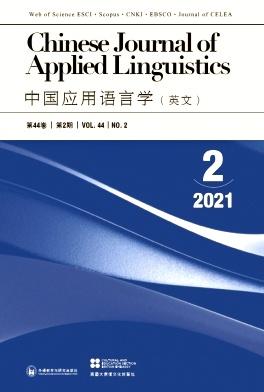One Journal, Different Practices: A Corpus-Based Study of Interactive Metadiscourse in Applied Linguistics
IF 1.1
4区 教育学
Q3 EDUCATION & EDUCATIONAL RESEARCH
引用次数: 0
Abstract
Research articles are a primary medium for scholars to communicate with disciplinary community, but there is little evidence suggesting how much writing practices on different research subjects within a discipline diverge in a single journal. This study remedies the oversight by comparing the use of interactive metadiscourse in the papers of同一期刊,不同实践:基于语料库的应用语言学互动元话语研究
研究文章是学者们与学科社区交流的主要媒介,但很少有证据表明同一学科内不同研究课题的写作实践在同一期刊中的差异有多大。本研究通过比较《应用语言学》有关语言习得和话语分析的论文中交互元话语的使用情况,弥补了这一疏忽。研究结果表明,语言习得领域的作者更频繁地使用添加式和后果式过渡标记、重定语和非整合式引用。然而,话语分析者更喜欢使用例证、线性和非线性引用以及话题转换。所有这些差异都可归因于学科研究范式的特点,从而导致学术写作中不同的知识生成和互动模式。研究结果为元话语在建构学科知识中的修辞功能提供了实证证据,并对EAP教师帮助应用语言学学者增加国际论文发表量提出了教学启示。
本文章由计算机程序翻译,如有差异,请以英文原文为准。
求助全文
约1分钟内获得全文
求助全文
来源期刊

Chinese Journal of Applied Linguistics
EDUCATION & EDUCATIONAL RESEARCH-
CiteScore
1.50
自引率
0.00%
发文量
377
期刊介绍:
The Chinese Journal of Applied Linguistics (CJAL) (formerly known as Teaching English in China – CELEA Journal) was created in 1978 as a newsletter by the British Council, Beijing. It is the affiliated journal of the China English Language Education Association (founded in 1981 and now the Chinese affiliate of AILA [International Association of Applied Linguistics]). The Chinese Journal of Applied Linguistics is the only English language teaching (ELT) journal in China that is published in English, serving as a window to Chinese reform on ELT for professionals in China and around the world. The journal is internationally focused, fully refereed, and its articles address a wide variety of topics in Chinese applied linguistics which include – but also reach beyond – the topics of language education and second language acquisition.
 求助内容:
求助内容: 应助结果提醒方式:
应助结果提醒方式:


